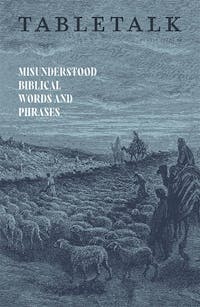
Request your free, three-month trial to Tabletalk magazine. You’ll receive the print issue monthly and gain immediate digital access to decades of archives. This trial is risk-free. No credit card required.
Try Tabletalk NowAlready receive Tabletalk magazine every month?
Verify your email address to gain unlimited access.
“Little ones to him belong; they are weak, but he is strong.” Almost everything we need to know about the spiritual life is packed into that little phrase. Physically fragile and spiritually frail believers belong to One who is strong. Our enemies—the devil, the world, and our flesh—are no match for the mighty Lord God (Rev. 18:8).
These same ideas are embedded in an even shorter phrase found almost 250 times in Scripture: Yahweh Sabaoth, which is usually translated “Lord of hosts.”
Here’s the problem: we might overlook this title of God because its English translation doesn’t awe like its Hebrew original. To us, a “host” can be a “multitude” or can describe an entertainer. But in Hebrew, “host” is far more majestic.
The term’s range of meaning suggests three powerful truths about our God.
- The Lord of hosts is the God of armies. The divine title regularly appears in battle settings. David didn’t drive out the invading Philistines alone; the “Lord of hosts” gave the victory (2 Sam. 5:10; 6:2). “The King of glory” is “the Lord, strong and mighty, the Lord, mighty in battle . . . the Lord of hosts” (Ps. 24:8, 10). God is a warrior who commands heaven’s armies against our most vicious foes.
- The Lord of hosts is the God of angels. Angels who surround the exalted Lord call to each other, “Holy, holy, holy is the Lord of hosts; the whole earth is full of his glory!” (Isa. 6:3). Angels will flank Jesus when He comes to earth in the Father’s glory (Matt. 16:27). In the meantime, they are ministering spirits whom God deploys to help His children (Heb. 1:14).
- The Lord of hosts is God Almighty. A Greek translation of the Old Testament emphasizes the might of Yahweh Sabaoth, the all-powerful One. In contrast to false gods that “cannot speak” (Jer. 10:5), when the Lord of hosts “utters his voice, the earth melts” (Ps. 46:6; see Jer. 10:13). The mighty God is also “the portion of Jacob, . . . and Israel is the tribe of his inheritance; the Lord of hosts is his name” (Jer. 10:16).
Herman Bavinck called the Lord of hosts the “king in the fullness of his glory, who, surrounded by regimented hosts of angels, governs the whole world as the Almighty, and in his temple receives the honor and acclamation of all his creatures.”

The name “Lord of hosts” reminds us of several ways that God cares for His beloved people.
- The Lord of hosts preserves the elect. Salvation never “depends . . . on human will or exertion” (Rom. 9:16) but depends on the mercy of the Lord of hosts, who has left a remnant (Isa. 1:9; Rom. 9:29). Inspired by Psalm 46, Martin Luther applied this title to Jesus. Whom did God choose to side with us despite our failed striving? “Christ Jesus, it is he, Lord Sabaoth his name, from age to age the same, and he must win the battle.”
- The Lord of hosts opposes injustice. Believe that the cries of helpless victims always reach “the ears of the Lord of hosts” (James 5:4). The unjust try to sin in secret. But the Lord of hosts cannot be deceived and will redress every crime. Seeking vengeance is redundant—God will avenge (Rom. 12:19).
- The Lord of hosts establishes peace. World history is a tale of relentless war. No leader but the Lord of hosts can command lasting peace. “He makes wars to cease to the end of the earth” (Ps. 46:9). God blesses believers with real peace now and teaches us to anticipate a day when the song will be fully realized: “God speaks and all is peace, from war the nations cease; the Lord of hosts is nigh.”
We must fight the good fight of faith (1 Tim. 6:12). But sometimes we flee (Acts 15:38), use the wrong weapons (2 Cor. 10:4), or box as if beating the air (1 Cor. 9:26). The Lord of hosts is the fighter we need on our side. So the old hymn is for everyone who knows that he is little but believes that God is big. “Jesus loves me, loves me still, though I’m very weak and ill; from his shining throne on high comes to watch me where I lie.” The Lord of hosts watches. He hears. He knows. And He acts. Whatever may fail, “The Lord of hosts is with us; the God of Jacob is our fortress” (Ps. 46:7).
